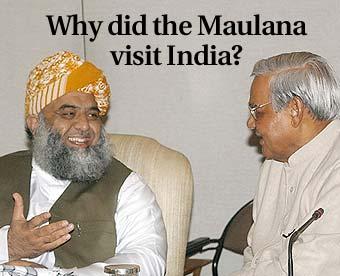by JAWED NAQVI

Prime Minister Atal Bihari Vajpayee during a visit to India in 2003 PHOTO/Rediff
In the aftermath of the anti-Ahmadi violence in the 1950s, Maulana Abul Hasanat Sayyed Muhammad Ahmad Qadri, President of Jamiatul Ulema-i-Pakistan, demanded an Islamic state in Pakistan. And he deposed before the Justice Munir Commission that looked into the violence.
Q: You will admit for the Hindus, who are in a majority in India, (a similar) right to have a Hindu religious state?
A: Yes.
Q: Will you have any objection if the Muslims are treated under that form of government as Malishes (Mlechhas) or Shudras under the law of Manu?
A: No.
Maulana Fazlur Rehman heads a faction of the Jamiat today. I gained a nodding acquaintance with the maulana when, for a reason difficult to fathom at the time, he became a regular interlocutor with Indian journalists visiting Pakistan. The maulana’s portly bearing and merry laughter had a likeness to Friar Tuck whose Robin Hood, albeit too briefly, Musharraf had become. A version of the English legend has the monk fording the river in Sherwood Forest with Robin Hood on his back when, in midstream, for no apparent reason, he hurled his friend into the freezing waters. That’s more or less what the maulana is said to have done with Musharraf.
A recent JUH statement effectively endorsed the abrogation of Kashmir’s autonomy.
In recent days, the cleric from the doctrinaire Deoband school of Muslim theology has been raging at Imran Khan, accusing the prime minister of insincerity towards the Kashmiri people facing Indian high-handedness since Aug 5. The stance is double-edged.
Fazlur Rehman has friends in high places with the Indian government. Besides, he has the entire Jamiatul Ulema-i-Hind (JUH) and the Deoband seminary eating out of his hands. Atal Behari Vajpayee embraced him and Manmohan Singh welcomed him to the prime ministerial residence. This was around the time when Benazir Bhutto was struggling to get an appointment with Vajpayee in New Delhi, when, as the grapevine had it, she was seeking his intervention to iron things out with Gen Musharraf.
Important Pakistani visitors from the left and liberal corner have not had the ease of access to the prime minister’s office in recent years as the maulana did. His equation with the Modi establishment is not clear, but given the Indian prime minister’s chummy relationship with the rulers of Saudi Arabia — a common link between Rehman and the JUH — it’s not difficult to imagine an agreeable prospect.
The fact that the maulana would routinely drive off to the Deoband seminary, not far from the Indian capital, following his official sojourns, suggests a link between the two stops. That P. Chidambaram made a much-publicised visit to the seminary as home minister further indicates a strong political interest between the Indian government and the orthodox clerics of Deoband. And perhaps it also delivers a handy vote bank that the clerics control.
There are Indian Muslim groups as well as non-Muslims who harbour sympathy for the Kashmiri people, but it is mostly with regard to their claim on Jammu and Kashmir’s autonomy within the Indian arrangement. Such groups also speak up against perennially violated human rights endured by the mainly Muslim people of the disputed area. To that extent the JUH has stood with the Kashmiri people, but only from the perspective that their interests were not separate from those of Indian Muslims.
In 2010, during Congress rule there was a surge in India’s stand-off with Kashmiri Muslims, and the JUH, a close cross-border comrade of Maulana Fazlur Rehman, did express its formulaic sympathy. A recent statement was, however, more assertive in its pro-government stance, effectively endorsing the abrogation of Kashmir’s autonomy.
Dawn for more
